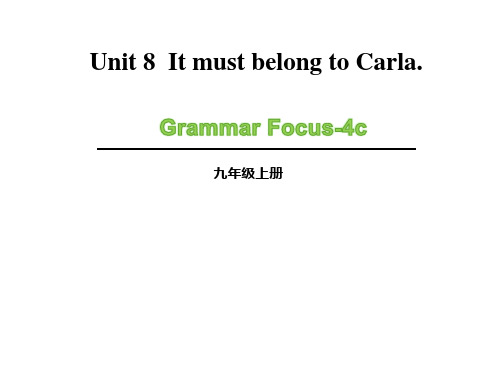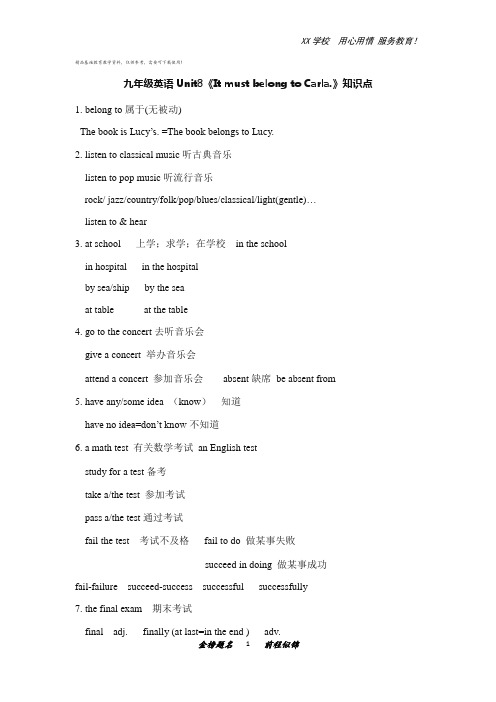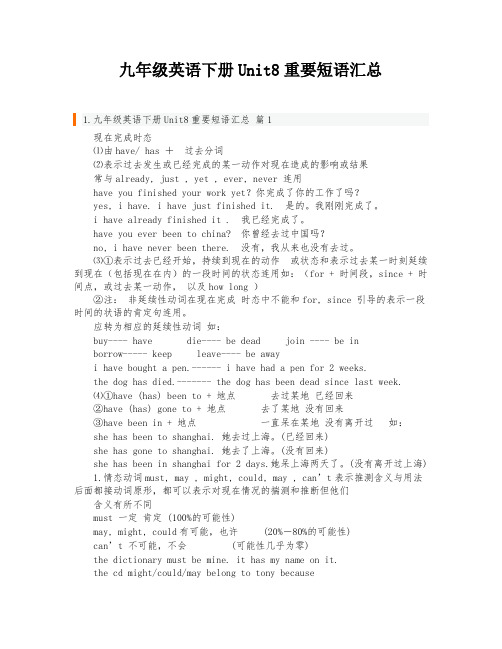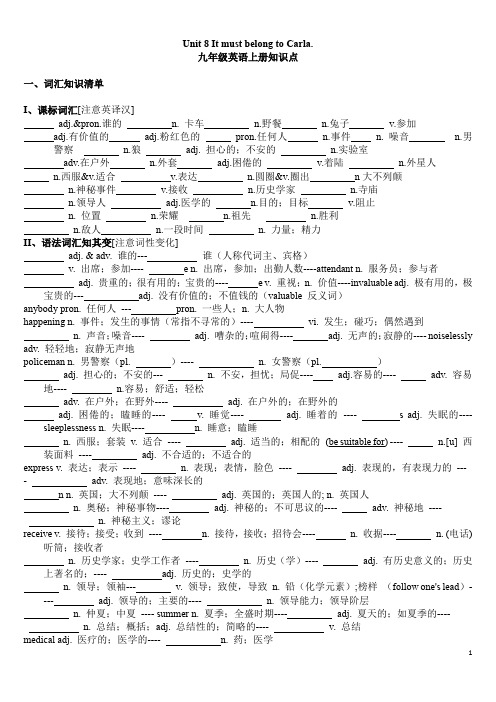九年级英语unit 8 语法 (情态动词)
人教版英语九年级全册Unit8 《section A GrammarFocus-4c 》课件

Ⅱ题型讲解--1. 师友练习
【活学活用一】
用适当的情态动词填空。
1. — Susan has bought a large house with a swimming pool. — It _m_u__st__ be very expensive. I never even dream about it.
本课时对本单元的重点句型做了归纳,进一步巩固学习 情态动词 must, might, could,can't表示推测。
Grammar Focus
I学习语法--1.师友感知
1.--Whose volleyball is this?. 这是谁的排球?
--It must be Carla’s. She loves volleyball.
4. A: Whenever I try to read this book, I feel sleepy. B: It can’t __b_e__th_a_t__b_o_r_in_g_/_b_e_i_n_t_e_re_s_t_in_g__.
III拓展提高--2.教师点拨 Whenever I try to read this book, I feel sleepy.
3.掌握so,as,because,or, not only...but also等连词的 用法。
1.在Section A部分,主要进行听说练习,在练习中初步 学习must, might, could, can't表推测的用法。 2.在Section B部分,重点学习2b部分的课文,了解关于 世界闻名的巨石阵的相关内容。在课文中,进一步学 习本单元的单词短语及语法要点。
2. something in the sky
it could be__a_p__la_n_e_ it must be _a__U_F_O_____
九年级英语全册Unit8ItmustbelongtoCarla重点归纳笔记(带答案)

九年级英语全册Unit8ItmustbelongtoCarla重点归纳笔记单选题1、We often have fun ________ after school.A.danceB.to danceC.dancingD.dances答案:C句意:放学后我们经常跳舞。
考查非谓语,have fun doing sth“做某事很开心”,是固定搭配。
故选C。
2、— Whose is the book written by Yang Jiang?—Carol’s favorite writer is Yang Jiang. It ______ be hers.A.mustn’tB.mustC.can’tD.can答案:B句意:——这本杨绛写的书是谁的?——Carol最喜爱的作家是杨绛,这本书一定是她的。
考查情态动词表示推测的用法。
mustn’t禁止,不要;must一定,肯定;can’t不可能;can可能。
根据句意可知,这里表示推测,根据Carol’s favorite wirter is Yang Jiang可知,书一定是她的,故选B。
3、I asked my father to _______ me _______ at the school gate at 6:30 so that we could visit Grandma together. A.pick; upB.turn; downC.let; downD.cheer; up答案:A句意:我让我父亲6:30在学校门口接我,这样我们就可以一起去看望奶奶了。
A. pick; up拾起;捡起;还有“用车去接...... ”的意思;B. turn; down关小;C. let; down使失望;使沮丧;D. cheer; up(使)振作起来。
根据后文so that we could visit Grandma together. 这样我们就可以一起去看望奶奶了。
人教版九年级英语Unit8知识点总结

精品基础教育教学资料,仅供参考,需要可下载使用!九年级英语Unit8《It must belong to Carla.》知识点1. belong to属于(无被动)The book is Lucy’s. =The book belongs to Lucy.2. listen to classical music听古典音乐listen to pop music听流行音乐rock/ jazz/country/folk/pop/blues/classical/light(gentle)…listen to & hear3. at school 上学;求学;在学校in the schoolin hospital in the hospitalby sea/ship by the seaat table at the table4. go to the concert去听音乐会give a concert 举办音乐会attend a concert 参加音乐会absent缺席be absent from5. have any/some idea (know)知道have no idea=don’t know不知道6. a math test 有关数学考试an English teststudy for a test备考take a/the test 参加考试pass a/the test通过考试fail the test 考试不及格fail to do 做某事失败succeed in doing 做某事成功fail-failure succeed-success successful successfully7. the final exam 期末考试final adj. finally (at last=in the end ) adv.8. because of +n./pron./doing 因为because+原因状语从句because & sothough/although & but even if/though 引导让步状语从句9. a present for his mother 送给她妈妈的礼物10. run for exercise 跑步锻炼do exercise 做运动do eye exercises 做眼保健操do morning exercises 做早操do exercises 做习题11. toy truck 玩具卡车12. her favorite writer/ author 她最喜爱的作家13. the only little kid/child唯一的小孩kid-kids child-childrenYou are kidding /You must be kidding.你一定在开玩笑No kidding.别开玩笑play a joke/trick on sb.14. hair band 发带15. in the music hall 在音乐大厅16. something valuable 贵重的东西value v.something unusual不寻常的东西something strange奇怪的事anything else其它的东西修饰不定代词的形容词后置不定代词作主语谓语动词用单三somebody/someone anybody/anyoneeverybody/everyone nobody/no onesomething anything everything nothingsomewhere anywhere everywhere nowhere否定词: no/not, nobody/no one/nothing, few/little, neither/none, seldom/hardly/never17.go to a picnic=go for a picnic去野餐at the picnic在野餐时18. the rest of my friends 我其余的朋友have a (good) rest 休息19. pick it up 捡起,拾起动词+副词give up, look up, fix up, cheer up, put up, dress up, make up, clean up, use up, eat up,动词+介词look after / look over20. each other=one another 互相,彼此21. nothing much没什么(事)22. be interviewed by… 被…采访20. strange noises 奇怪的声音make a noise 吵闹noise-maker 噪音的制造者noise n. noisy adj. noisily adv.21. outside our window在我们的窗外inside indoor-outdoor upside-downside22. next-door neighbor隔壁邻居23. at first 首先,起初first of allat the beginning of(at the end of)to start withfirstly, secondly, thirdly, fourthly…..24. run away 逃走escape from 从..逃跑25. feel uneasy 感到不安unhealthy/ unusual/ unlucky/unhappy/uncomfortable/ unimportant/ unbelievabledislike/disagree/disappoint/disabledimpossible/impolite26. go away 走开,离开(be away)keep away from 使… 远离run away 逃跑far away远take away 带走27. have fun doing sth.做某事开心have a hard time doing=have a difficult time doing=have trouble/problems/difficulty doing 做某事有困难look forward to doing 向往做某事pay attention to doing 注意做某事keep/stop/prevent from sb. doing 阻止某人做某事give up doing 放弃做某事put off doing 推迟做某事28. create fear制造恐惧created adj.29. in the neighborhood 在社区30. There must be …doing sth. 一定有…在做某事There will be there is/are going to be 将有31. in the laboratory/lab 在实验室32. hear water running听见流水声hear/see/notice/feel/watch sb. doinghear/see/notice/feel/ watch sb. do 变被动还原to33. cough a lot 咳得厉害cough badly34. run after追赶35. a woman with a camera 一位拿相机的妇女36. at work 在工作be working37.might/could/may be late for work 可能上班迟到38. must be dreaming一定在做梦can’t be dreaming39. run to do sth. 跑着去做某事run for exercise跑步锻炼run after run away run-ran-run runner running40. catch a bus 赶公共汽车get on get off41. make a movie 拍电影42. wear a suit 穿西服/套装43. express a difference / result 表达差异/ 结果expression44. add information 添加信息message news information45. at the same time 同时at that time =thenat this time=at the moment= now=right nowat times=sometimes=from time to time=once in a whileon time in time46. a rock circle 一个石头圈47. not only …but also…不仅…而且…either…or.. 或者…或者…neither… nor…既不…也不…There be… 有…neither of +名词复数+ 谓语(单)none of+名词复数+ 谓语(单)Neither+助词/ 情态动词/系动词+主语sb. neither Nor+助词/ 情态动词/系动词+主语So+助词/ 情态动词/系动词+主语sb, too48.Britain’s most famous historical places英国最著名的历史名胜a place of interest 名胜49.receive more than 10 visitors 接待10多名游客receive客观收到accept 主观接受50.on the longest day of the year 在一年中最长的那天51. ancient leaders/rulers古代领导者52. a group of… 一群… a crowd of53.a bit/a little/a little bit/kind of late 有点晚儿a little & a bit of54. communicate with the gods 与上帝交流have a conversation with sb. 和.. 交谈conservation 保持55 so many centuries ago许多世纪前so many/much56. point out 指出point at指着57. a kind of calendar 一种日历58. put together 放在一起get together 聚在一起gather 聚集59. in a certain way 以某种方式60. on midsummer’s morning 在仲夏的上午61.shine directly into… 直接照进…shine-shone-shonesunshine阳光62. the center of the stones石头的中心63. a medical purpose 一个医学目的medical college医学院64. prevent illness 阻止疾病65. move up 上升,提升rise & raise66. from your feet move up your body 从你的脚上升到你的身体67. the position of… …的位置68.for a special purpose为了一个特别的目的69. a burial place 一个墓地bury v.70. a place to honor ancestors祭拜祖先的地方71.celebrate a victory over an enemy庆祝战胜敌人72. a long period of time 很长一段时间73.must, may, might, could, may, can’t+动词原形表示推测,程度不同must be一定,肯定(100%的可能性)may/might/could be有可能, 也许(20%-80%的可能性)can’t be不可能, 不会(可能性几乎为零)例:The dictionary must be mine. It has my name on it.The CD might/could/may belong to Tony, because he likes listening to popmusic.The hair band can’t be Bob’s. After all, he is boy!74. take place 常指“(某事)按计划进行或按计划发生”(二者都无被动)happen常指具体事件的发生,特别指那些偶然或未能预见的“发生”例:Great changes have taken place in China since.New things are happening all around us.take place还有“举行”之意。
九年级英语下册Unit8重要短语汇总

九年级英语下册Unit8重要短语汇总1.九年级英语下册Unit8重要短语汇总篇1现在完成时态⑴由have/ has +过去分词⑵表示过去发生或已经完成的某一动作对现在造成的影响或结果常与already, just , yet , ever, never 连用have you finished your work yet?你完成了你的工作了吗?yes, i have. i have just finished it. 是的。
我刚刚完成了。
i have already finished it . 我已经完成了。
have you ever been to china? 你曾经去过中国吗?no, i have never been there. 没有,我从来也没有去过。
⑶①表示过去已经开始,持续到现在的动作或状态和表示过去某一时刻延续到现在(包括现在在内)的一段时间的状态连用如:(for + 时间段,since + 时间点,或过去某一动作,以及how long )②注:非延续性动词在现在完成时态中不能和for, since 引导的表示一段时间的状语的肯定句连用。
应转为相应的延续性动词如:buy---- have die---- be dead join ---- be inborrow----- keep leave---- be awayi have bought a pen.------ i have had a pen for 2 weeks.the dog has died.------- the dog has been dead since last week.⑷①have (has) been to + 地点去过某地已经回来②have (has) gone to + 地点去了某地没有回来③have been in + 地点一直呆在某地没有离开过如:she has been to shanghai. 她去过上海。
人教版初中初三九年级英语第八单元unit8教材全解加课后练习附答案(8页)备课教案教学设计教学反思导学案

导学案教师: 学生: 年级:日期: 星期: 时段:课题第Unit8 It must belong to Carla考点分析:unit8核心语法之情态动词表示推测的用法学习目标与考点分析情态动词表推测的用法;表达某人的想法与观点学习重点学习方法学习内容与过程课文解读Section BStonehenge ---- Can Anyone Explain Why It Is There?Stonehenge, a rock circle, is not only one of Britain’s most famous historical places but also one of its greatest mysteries. Every year it receives more than 750,000 visitors. People like to go to this place especially in June as they want to see the sun rising on the longest day of the year.For many years, historians believed Stonehenge was a temple where ancient leaders tried to communicate with the gods. However, historian Paul Stoker thinks this can’t be true because Stonehenge was built so many centuries ago. “The leaders arrived in England much later,” he points out.Another popular idea is that Stonehenge might be a kind of calendar. The large stones were put together in a certain way. On midsummer’s morning, the sun shines directly into the center of the stones. Other people believe the stones have a medical purpose. They think the stones can prevent illness and keep people healthy. “As you walk there, you can feel the energy from your feet moving up your body,” said one visitor. No one is sure what Stonehenge was used for, but most agree that the position of the stones must be for a special purpose. Some think it might be a burial place, or a place to honor ancestors. Others think it was built to celebrate a victory over an enemy.Stonehenge was built slowly over a long period of time. Most historians believe it must be almost 5,000 years old. One of the greatest mysteries is how it was built because the stones are so big and heavy. In2001, a group of English volunteers tried to build another Stonehenge, but th ey couldn’t. “We don’t really know who built Stonehenge,” says Paul Stoker. “And perhaps we might never know, but we do know they must have been hardworking ---- and great planners!”要点详解1.Why do you think the man is running?本句由“疑问词+do you think+其他”构成的特殊疑问句。
2022-2023学年九年级英语同步知识Unit 8

Unit 8 It must belong to Carla.九年级英语上册知识点一、词汇知识清单I、课标词汇[注意英译汉]adj.&pron.谁的n. 卡车n.野餐n.兔子v.参加adj.有价值的adj.粉红色的pron.任何人n.事件n. 噪音n.男警察n.狼adj. 担心的;不安的n.实验室adv.在户外n.外套adj.困倦的v.着陆n.外星人n.西服&v.适合v.表达n.圆圈&v.圈出n大不列颠n.神秘事件v.接收n.历史学家n.寺庙n.领导人adj.医学的n.目的;目标v.阻止n. 位置n.荣耀n.祖先n.胜利n.敌人n.一段时间n. 力量;精力II、语法词汇知其变[注意词性变化]adj. & adv. 谁的--- 谁(人称代词主、宾格)v. 出席;参加---- e n. 出席,参加;出勤人数----attendant n. 服务员;参与者adj. 贵重的;很有用的;宝贵的---- e v. 重视;n. 价值----invaluable adj. 极有用的,极宝贵的--- adj. 没有价值的;不值钱的(valuable 反义词)anybody pron. 任何人--- pron. 一些人;n. 大人物happening n. 事件;发生的事情(常指不寻常的)---- vi. 发生;碰巧;偶然遇到n. 声音;噪音---- adj. 嘈杂的;喧闹得---- adj. 无声的;寂静的---- noiselessly adv. 轻轻地;寂静无声地policeman n. 男警察(pl. )---- n. 女警察(pl. )adj. 担心的;不安的--- n. 不安,担忧;局促---- adj.容易的---- adv. 容易地---- n.容易;舒适;轻松adv. 在户外;在野外---- adj. 在户外的;在野外的adj. 困倦的;瞌睡的---- v. 睡觉---- adj. 睡着的---- s adj. 失眠的---- sleeplessness n. 失眠---- n. 睡意;瞌睡n. 西服;套装v. 适合---- adj. 适当的;相配的(be suitable for) ---- n.[u] 西装面料---- adj. 不合适的;不适合的express v. 表达;表示---- n. 表现;表情,脸色---- adj. 表现的,有表现力的---- adv. 表现地;意味深长的n n. 英国;大不列颠---- adj. 英国的;英国人的; n. 英国人n. 奥秘;神秘事物---- adj. 神秘的;不可思议的---- adv. 神秘地----n. 神秘主义;谬论receive v. 接待;接受;收到---- n. 接待,接收;招待会---- n. 收据---- n. (电话)听筒;接收者n. 历史学家;史学工作者---- n. 历史(学)---- adj. 有历史意义的;历史上著名的;---- adj. 历史的;史学的n. 领导;领袖--- v. 领导;致使,导致n. 铅(化学元素);榜样(follow one's lead)---- adj. 领导的;主要的---- n. 领导能力;领导阶层n. 仲夏;中夏---- summer n. 夏季;全盛时期---- adj. 夏天的;如夏季的----n. 总结;概括;adj. 总结性的;简略的---- v. 总结medical adj. 医疗的;医学的---- n. 药;医学prevent v. 阻止;阻挠---- n. 预防;阻止;妨碍---- adj. 预防性的;防备的energy n. 力量;精力---- adj. 精力充沛的;有活力的--- adv. 积极地;精力充沛地n. 埋葬;安葬;adj. 埋葬的---- v. 埋葬;隐藏---- adj. 埋葬的;埋藏的honor n. 荣幸;荣誉;v. 敬重;表示敬意---- adj. 光荣的;可敬的;高贵的ancestor n. 祖宗;祖先---- . 祖先;血统victory n. 胜利;成功---- n. 胜利者---- adj. 胜利的;凯旋的III、重点短语知搭配[注意固定短语的英汉互译]1. 属于2. 流行音乐3. 最喜欢的作家4. 玩具卡车5. 发带6 参加一个音乐会7.一些宝贵的东西8.去野餐9. 其余的/剩余的…10 拣起,拾起11. 彼此,互相12. 曾经是13. 不寻常的事14 奇怪的声音15. 在窗外16. 报警17. 隔壁的邻居18. 起初,开始19. 看见某人正在做某事20. 逃跑21. 太…而不能…22. 感到不安23. 有某人自己的想法24. 一定有…25. 有…正在做某事26. 在某人的小区27. 不知道28. 很开心地做某事29. 太多30. 制造恐惧31 在实验室32. 戴眼镜33. 考虑,打算做某事34. 洗澡35. 严重咳嗽36. 看起来像37. 迟到38. 不仅…而且…(注意:就近原则)39. 看太阳升起40. 与…交流41. 指出42 以某种方式43.向上移动44.庆祝胜利45.很长一段时间46.一群…IV、核心单词知用法[注意固定短语、句型和词块]1. picnic n.野餐【短语】在野餐have a picnic/ go for a picnic去野餐常指参见正式的活动或场合,如婚礼、会议等指参加群众性活动,并着重说明句子主语(参加者)在活动中发挥作用多指“加入”某组织、团体,后多接表示组织的名词,如俱乐部、军队等多指参加小规模的活动,如游戏、比赛【短语】对...来说很贵重/重要【拓展】value n.价值&v.重视;珍惜adj.无价的4.noise n. 噪音常指不悦耳的声音,如噪音、杂音、吵闹声指人发出的声音,如说话声、唱歌声,意为“嗓音”泛指人们听到的自然界的一切声音既可以作为动词,意为“睡觉”,也可以作为名词“睡眠”,有充足的睡眠形容词,意为“正熟睡的”,强调动作正在进行既可以作为前置定语,也可以作为表语形容词,意为“困倦的”,既可以作为定语,也可以作为便于。
Unit8 (Section B 1a-1d)九年级英语全一册(人教新目标Go For It!)
land 追逐
alien coat
Are you interested in the UFO and aliens?
Do you thiAnkltiheenresare aliens and UFO?
02 Pre-listening
Pre-listening
1aLeabharlann Look at the pictures. Then use
d__re_a_m__i_n_g_.__
they must be
_m__a_k_in__g_a__m__ovie.
While-listening
Listen again, fill in the blank
Man: Hey, look at the man running down the street. I wonder what’s happening?
追逐 Woman: Look, now the UFO is landing…
Man: And there’s something strange getting out. It must be an alien.
Man: But he’s wearing a suit. He might be
Woman: And the alien is running after the man! I must
Woman: It’s a woman with a camera.
Man: She could be from the TV news.
must be making
Woman: No, look at all those other people. They’re actors. Oh! They
人教版英语九年级Unit 8知识点总结
九年级Unit 8 It must belong to Carla. 讲义一、词性转换Section A1. valuable→ (n.) value2. happening → (v.) happen3. noise→ (adj.) noisy4. uneasy → (反义词.) easy5. laboratory → (缩写.) lab6. sleepy → (v.) sleep Section B7. suit → (adj.) suitable8. express → (n.) expression 9. Britain → (adj.) British10. mystery → (adj.) mysterious11. historian → (adj.) historical12. leader → (v.) lead13. medical → (n.) medicine14. energy → (adj.) energetic15. burial → (v.) bury16. honor → (adj.) honorable二、短语归纳1. belong to属于2. at the picnic在野餐中3. attend a concert参加音乐会4. pick up 捡起5. nothing much没什么事6. call the policemen报警7. at first起初8. in the neighborhood在社区里9. go away离开10. feel sleepy感觉困倦的11. run after追赶12. express a difference表达差异13. communicate with sb. 和某人交流14. arrive in + 大地点到达某地15. prevent illness预防疾病16. keep healthy保持健康17. point out指出18. a victory over an enemy战胜敌人19. wait for等待20. be late for迟到21. on the phone通过电话1. What’s wrong with …? …怎么了?2. used to do sth. 过去常常做某事3. see sb. doing sth. 看见某人正在做某事4. have fun doing sth. 做某事有乐趣5. could/ might be doing sth. 可能正在做某事6. try to do sth. 尽力做某事7. stop sb. from doing sth. 阻止某人做某事8. must have done 一定已经做了…9. one of + the + 形容词的最高级+名词复数形式最…的…之一三.重点句子1. I attended a concert yesterday so it might still be in the music hall. 昨天我参加了一个音乐会,所以它可能仍然在音乐大厅里。
九年级英语全册Unit8ItmustbelongtoCarla考点总结(带答案)
九年级英语全册Unit8ItmustbelongtoCarla考点总结单选题1、-I tried to make Alice ___________ her mind but I found it difficult.-Well, I saw you __________that when I went past.A.changed; doB.changes; doingC.change; to doD.change; doing答案:D句意:——我尽量让爱丽丝改变她的想法,但是我发现很难。
——当我经过的时候,我看见你在做那件事。
make sb do sth使某人做某事;see sb do sth看到某人做过某事,已经做完;see sb doing sth看见某人在做某事,还在做;第一空排除AB;第二空排除C,根据题意,故选D。
小提示:See sb./sth .doing强调看见时,后面的动作正在进行。
See sb/ sth do强调看见后面的动作经常发生,或者看见后面的动作的全过程。
2、--Whose cap is this? Is it Cindy’s?--It___be hers. Don't you remember she even didn't come to the party?A.can’tB.mightC.may notD.must答案:A句意“-这是谁的帽子?是辛迪的吗?-一定不是她的,你不记得了吗?她甚至都没来参加派对”。
A.一定不是(表示否定推测);B.可能;C.可能不;D.一定(表示肯定推测)。
根据she even didn't come to the party可知,她甚至都没来参加派对,所以帽子一定不是她的,故选A。
小提示:情态动词表推测的词有:must(一定)具有100%的可能性;may(可能),具有20%—80%的可能性;might(可能),may的过去式,可能性比may小;may not(可能不);can't(一定不),具有0%的可能性。
Unit 8表推测的情态动词(重点语法提升练)-九年级英语全一册单元模块满分必刷题(人教版)
2022-2023学年九年级英语全一册单元模块满分必刷题(人教版)Unit 8【刷语法】(重点语法提升练)表推测的情态动词一、单项选择1.(2022·江苏·连云港外国语学校二模)Dad signed for a package (包裹) just now. I’m sure it ________ be a “Bing Dwen Dwen” from my uncle in Beijing.A.may B.should C.must D.can2.(2022·湖北武汉·九年级阶段练习)—The clothes on your bed ________ be very dirty, Jim. They are smelly.—Oh. I forgot to put them into the washing machine.A.need B.might C.must D.can3.(2022·辽宁大连·八年级期末)There ________ be something wrong with him. He cried sadly just now. A.need B.can C.must D.would4.(2021·黑龙江·哈尔滨市风华中学校九年级期中)—Listen! I think it ________ be Mrs. Li singing in the next room.—It ________ be her. I know she has already left for New York.A.may, must B.must, can’t C.must, mustn’t5.(2021·江苏泰州·八年级期中)—We plan to have a class trip tomorrow. Will it be sunny?—It ________ fine. Who knows? The weather always changes quickly.A.may be B.will be C.must be D.maybe6.(2022·河北·育华中学一模)—I’m looking for our English teacher. Where is she?—She __________ be in Class One. It’s their English class now.A.must B.can C.may D.need7.(2022·四川·巴中市教育科学研究所中考真题)—Selina, I want to learn something about the Winter Olympic Games in Beijing.—Frank ________ know it, because he cares best about it.A.has to B.must C.can’t D.might8.(2022·辽宁·铁岭县莲花第一初级中学一模)There are many people waiting to buy seafood. I’m sureit ________ be delicious.A.can B.could C.may D.must9.(2022·辽宁锦州·中考真题)—Will plants grow on other planets?—That ________ be true. It’s really difficult to predict the future.A.mustn’t B.should C.needn’t D.may10.(2022·湖南益阳·中考真题)— Is it important to protect wild animals, Susan?— Yes. If we don’t protect them, they ________ die out one day.A.need B.can’t C.may11.(2017·湖南湘潭·中考真题)Andy ________ come to our reading club, but she hasn’t decided yet. A.may B.mustn’t C.will12.(2017·四川遂宁·中考真题)—Listen! I think it ________be Mr. White singing in the office. —No. It ________ be him. He left for London just now.A.must; mustn’t B.may; mustn’t C.must; can’t D.can; can 13.(2021·山东青岛·中考真题)—I’m sorry I ________ not get there on time. The traffic is heavy now.—That’s OK. Take your time.A.must B.may C.need D.should 14.(2017·四川泸州·中考真题)— What are you going to do next week?— I am not sure. I ________ work in an old people’s home.A.must B.may C.should D.can15.(2021·辽宁朝阳·中考真题)—What will the weather be like tomorrow?—It ________ be rainy, cloudy or sunny. I am not sure.A.must B.may C.can’t D.should 16.(2021·江苏宿迁·中考真题)—Sandy, is Mr Li in the teachers’ office now?—I am not sure. He ________ be there.A.must B.can’t C.mustn’t D.may17.(2022·湖南怀化·中考真题)—Whose English book is this?—It _______ be Lily’s, but I’m not sure.A.might B.can’t C.must18.(2016·内蒙古呼和浩特·中考真题)—where are you going this month?—we ________ go to Xiamen. But we’re not sure.A.needn’t B.might C.must D.mustn’t19.(2019·四川攀枝花·中考真题)—Excuse me, is this the right way to the library?—Sorry, I am not sure. But it ________ be.A.need B.will C.must D.might20.(2022·湖北武汉·二模)—Shall I meet you at the train station, Emma?—That couldn’t be better. I ________ get lost though I’ve been to your city twice.A.must B.shall C.would D.might21.(2022·湖北武汉·模拟预测)— Did you find your English notebook?— No. I’d searched all the places where I __________ have left it, but with no luck!A.must B.might C.can D.should22.(2022·云南·昭通市昭阳区第二中学模拟预测)— What will the weather be like tomorrow?— It ______ be rainy, cloudy or sunny. I’m not sure.A.might B.should C.can’t D.must23.(2022·吉林长春·三模)— Will Lucy go to the movies with us tonight?— She ________ come, but I’m not sure.A.can B.must C.might D.can’t24.(2022·江苏南通·模拟预测)—Look! The man who is playing basketball with the boys must be Mr Wang.—It _________ be him. He went abroad for further study yesterday.A.needn’t B.may not C.can’t D.mustn’t25.(2022·内蒙古兴安盟·二模)—Is that Kate? Let’s go up to say hello to her.—No, it ________ be Kate. She has gone to England for further study.A.mustn’t B.needn’t C.can’t D.shouldn’t 26.(2022·江苏省锡山高级中学实验学校三模)—Is the girl at the charity show Anita? She looks so beautiful!—No, Anita ________ be at the show. She has gone to Shenzhen for an important meeting.A.mustn’t B.can’t C.needn’t D.couldn’t27.(2022·湖北湖北·模拟预测)—Listen. Is Mike playing the piano?—No. it ________ be him. He has gone to Beijing.A.may not B.can’t C.mustn’t D.couldn’t28.(2022·湖北孝感·模拟预测)—Is the man Mr. Hunt?—It ________ be him. He has gone to Wuhan.A.mustn’t B.needn’t C.can’t D.won’t29.(2022·湖北·武汉外国语学校(武汉实验外国语学校)模拟预测)—Why don’t you ask Steven to help with the party preparations?—Oh, he ________ be available—he’s busy with his report these days.A.mustn’t B.shouldn’t C.can’t D.needn’t30.(2022·湖北咸宁·模拟预测)—Lucy is walking the dog in the park.—She ________ be. Listen! She is singing loudly in her room.A.can’t B.won’t C.mustn’t D.needn’t31.(2022·重庆市杨家坪中学二模)That football player ________ be my brother because he lost his two legs in an car accident last year.A.can B.can’t C.must D.mustn’t32.(2022·广西玉林·二模)— We seemed to meet our English teacher on the playground.— It ________ be her. Because I saw her enter the library just now.A.needn’t B.mustn’t C.can’t D.shouldn’t 33.(2022·山东·济南市章丘区第四中学一模)—Mr. Smith must have been to your home this morning. —No, he _________, because he didn’t know my address.A.couldn’t B.can’t C.mustn’t D.may not34.(2019·安徽合肥·二模)— Lucy, I’ve signed for the box. What’s it?— I’m not sure. It ________ be a dress.A.need B.must C.could D.will35.(2022·江西抚州·一模)— Whom does the yellow umbrella belong to, Lily?— It ________ be Linda’s. She likes this color, but I’m not sure.A.can’t B.must C.couldn’t D.may36.(2020·内蒙古包头·模拟预测)— My Chinese book is nowhere to be found. Where ______ it be?— Is it under the sofa?A.could B.must C.will D.need37.(2020·湖北武汉·二模)—Is the man at the gate your math teacher Mr. Li?—No, it________be him. Mr. Li has gone to Beijing.A.must B.might C.can’t D.could38.(2022·江西·模拟预测)—Mom, I got a box from the Yuantong Express(快递) ,what’s in it?—I’m not sure. I bought so many things on line this week, it _____ be your shoes.A.should B.must C.could D.need39.(2022·四川达州·模拟预测)—Look! There are so many people in the restaurant.—Yes. The food there ________ be delicious.A.must B.shouldn’t C.can’t D.need40.(2022·湖北武汉·三模)Put on more clothes on this freezing day. You ________ be feeling cold with only a shirt on.A.can B.might C.could D.must二、完成句子41.(2022·甘肃平凉·二模)一定有什么东西闯入我们社区的住户家中。
- 1、下载文档前请自行甄别文档内容的完整性,平台不提供额外的编辑、内容补充、找答案等附加服务。
- 2、"仅部分预览"的文档,不可在线预览部分如存在完整性等问题,可反馈申请退款(可完整预览的文档不适用该条件!)。
- 3、如文档侵犯您的权益,请联系客服反馈,我们会尽快为您处理(人工客服工作时间:9:00-18:30)。
九年级英语unit 8语法 (情态动词) (1 页 共 2 页) 九年级英语unit 8 语法(情态动词) 情态动词:情态动词有具体的词义;情态动词没有人称和数的变化;情态动词后必须加上动词原形;情态动词同助动词一样,需要与其他词语一起构成句子的谓语。 can :1、表示能力,意为 “能 会”; 2、表示请求, 允许, 意为“可以”; 3、表示推测, 意为 “可能”。
could:1、can 的过去式,意为“能、会”, 表示过去的能力 2、在疑问句中表示委婉请求
may:1、表示请求、许可,意为“可以” 2、表示推测,常用于肯定句中,意为“可能、也许”
might:1、may的过去式 2、表示推测,常用于肯定句中,意为“ 可能、也许 ”
must:1、表示主观看法,意为“必须、应该” 2、表示有把握的推测,用语肯定句
need:1、表示需要、必须,主要用于否定句和疑问句中 should:1、意为“ 应该”, 表示要求和命令 2、表示劝告、建议 had better:意为 “最好”,表示建议 (一) can 的用法 1.表示能力(体力、知识、技能)。 Can you lift this heavy box? Mary can speak three languages. Can you skate? Can只有一般现在时和一般过去式;而be able to可以用于任何时态时态。 I’ll not be able to come this afternoon. 当表示“经过努力才得以做成功某事”时应用be able to,不能用Can。 He was able to go to the party yesterday evening in spite of the heavy rain.
2.表示请求和允许, 此时可与may互换。在疑问句中还可用could, might代替,不是过去式,只是语气更委婉。 (1).---Can I go now? --- Yes, you can. / No, you can’t. (2).--- Could I come to see you tomorrow? --- Yes, you can. ( No, I’m afraid not. )
3.表推测可能性。 Someone is knocking at the door, and who can it be?
It can’t be Tom because he has gone to Beijing. (二)、could的用法 1、can的过去式, 意为“ 能、 会” , 表示过去的能力。 He could write poems when he was 10.
2、 could 在疑问句中, 表示委婉的语气, 此时 could 没有过去式的意思。 ---Could I use your pen? ---Yes, you can.
(三)、 may的用法 1、表示请求、许可, 比can 正式。 May I borrow your bike? You may go home now.
2、 表示推测,谈论可能性,意为“ 可能, 或许”。 It may rain tomorrow . She may be at home.
3、 may的过去式为might ,表示推测时。可能性低于may 。 He is away from school. He might be sick.
(四)、 must的用法 1、must 表示主观看法,意为“必须、一定”。 You must stay here until I come back. Must I hand in my homework right now?
2、must否定形式mustn’t 表示“ 一定不要 、千万别、禁止, 不许”。 You mustn’t play with fire. Y ou mustn’t be late.
3、以must开头的一般疑问句,肯定回答用must,否定回答用needn’t 或 don’t have to 。 ---Must I finish my homework? ---No, you needn’t.
4、must 一定,表示有把握的推测,用于肯定句中。 The light is on, so he must be at home now.
(五)、 need的用法 1、need 作情态动词时,情态动词+V原(以need开头的一般疑问句,肯定回答用must,否定回答用needn’t 或 don’t have to 。 ---Need I stay here any longer? ---Yes, you must. ---No. you needn’t .
2、need作实义动词时,有人称、数和时态的变化。 当主语是人时用need to do sth,当主语是物时用need doing sth. I need to do it right now. He needs to learn more about the girl.
(六)、dare 的用法(敢、敢于) 1、dare 作为情态动词,无第三人称单数形式,只有一般现在时和一般过去九年级英语unit 8语法 (情态动词) (2 页 共 2 页)
时。 Dare he tell them what he knows?
2、dare 作为实义动词(dare to do sth),此时有人称、数及时态的变化。 He doesn’t dare to break his promise.
(七)、should的用法 1、should 意为“应该” , 可表示劝告、建议、义务、责任等。 We should protect the environment.
2、Should have done 表示对过去动作的责备、批评。 You should have finished your homework.
(八)、had better 的用法(最好,没有人称的变化)had better (not)do sth
We had better go now. You had better not give the book to him.
表示推测含义的情态动词:must 一定>can可能>could可能>may可
能>might可能>may not可能不>can’t不可能
1.--- go to the cinema, mum? ---Certainly, but you ________ be back by 11 o’clock. A. can B. may C. must D. need 2.You ______ get there by bus. A. don’t need B. needn’t to C. don’t need to D. need don’t to 3.You _______ worry about me. It’s nothing serious. A. can’t B. mustn’t C. needn’t D. won’t 4. The man in the office be Mr. Black because he went home just now. A.mustn’t B.may not C.can’t D.needn’t 5.---Can you go surfing with us this afternoon? ---I’d like to , but I look after my sister at home , because my mother is ill. A.need B.must C.have to D.should 6.---May I take this book out of the reading room? --- .Pease read it here. A. Certainly B.No, you needn’t C.No, you mustn’t D.No, you may not 7.--- Where is Mary? --- She in the library. A.should be B.must be C.can be D.must have been 8.His room is dark. He must to bed. A.go B.be going C.have gone D.have been gone 9.---Will your father stay home tonight? ---I’m not sure, He to work. A.must go B.can go C.may be gone D.may be going 10.---Where is Tom? ---He isn’t here I think he have gone home. A.may B.must C.might D.A or B or C 11 .---I think Helen is at home. ---No, she be at home, for she phoned me from the airport just five minutes ago. A.mustn’t B.needn’t C.can’t D.daren’t 12. He’s late. What have happened to him? A.can \B.may C.should \ D.must 13.--- he be watching TV now? ---Yes, he be watching TV now. ---No, he _____ be watching TV now.” A. Must; can; mustn’t B. Can; must; can’t C. Must; must; can’t D. Can; can; mustn’t 14. You must be a writer, you? A.mustn’t B.are C.must D.aren’t 15. You must have seen her yesterday, you? A.mustn’t B.haven’t C.didn’t D.don’t 16. You must have seen her, you? A.haven’t B.didn’t C.don’t D.A or B 17.He have come here yesterday, but he didn’t. A. could B. should C. ought to D. A or B or C 18.---Must he do it? ---No, he . A. mustn’t B. needn’t C. doesn’t have to D. B or C 19.---Need you go now? ---Yes, I . ---No, I . A. need; needn’t B. must; needn’t C. may; mustn’t D. can; needn’t 20. ---May I borrow your bike? ---No, you . A. mustn’t B. may not C. had better not D. can’t
